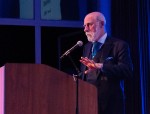A UCLA alumnus who helped create the internet said he thinks it has many possibilities to grow – but also faces challenges – at an event Monday.
Vint Cerf, a vice president and chief evangelist at Google who graduated from UCLA in 1972, talked about the development of the Internet Protocol suite and the problems the internet may face at an event in Royce Hall. About 75 students and faculty attended the event. Cerf is known for co-creating the Internet Protocol suite, which is a blueprint for how to communicate data that would create the internet.
Cerf said he had many difficulties when trying to create a protocol for the internet, including wrongly estimating the number of countries when deciding what length to use for IP addresses, which are assigned to individual computers.
“We didn’t know how many countries there were, and there wasn’t any Google to ask,” he said. “So we guessed 128.”
Eventually, there were not enough IP addresses for the actual number of computers, so the newer version of the Internet Protocol increased the size of IP addresses, Cerf added.
Cerf said he is concerned that some programmers may simply create software to get paid and do not make an effort to find all of the bugs in their code, which can lead to software malfunctioning. The person who ends up being affected is the user, not the programmer of the software, he added.
“Up until now, programmers, including myself, have gotten away with murder. I think that (now) the programmers will have to feel the weight on their shoulders because people are going to rely on the software to do things,” he said. “ There will be consequences for producing bad code.”
Cerf added that because many digital objects, such as videos and photos, sit in physical mediums, they may be unable to be read by future technology. For example, he said it is difficult today to find technology that can read a floppy disk.
“People in the 22nd century wondering about the 21st century (will ponder), … where are the tweets, where are the Facebook posts, where are the blogs?”
Cerf said he thinks engineers will eventually have to figure out how to improve the interplanetary internet by shortening the time it takes to send signals between planets.
For example, he said currently it can take up to hours to send a signal to a rover on Mars and if the rover is about to drive off a cliff, the signal would take too long to stop it.
Several students who attended the event said they learned new things about the history and future of the internet.
Vipul Kamani, a first-year business economics student, said he attended the event to learn more about what the internet would be like in the future.
“Events like these are a good opportunity for UCLA students to meet people that have played a big role in what the world is today,” he said.
Grace Guenon, a fourth-year financial actuarial mathematics student said she learned there is an interplanetary internet.
Cerf said that computers are becoming central to science because individuals can create models and conduct experiments without having to perform them in the real world.
“You can program anything you can figure out how to program. That’s one of the most beguiling aspects of not just the internet but software in general,” he said. “Software is an endless frontier.”
